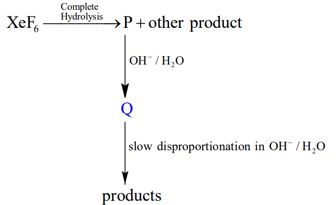EASY
Earn 100
SbF5 racts with XeF4 to form an adduct. The shapes of cation and anion in the adduct are respectively :
(a)Square planar, trigonal bipyramidal
(b)T-shaped, octahedral
(c)Square pyramidal, octahedral
(d)Square planar, octahedral
50% studentsanswered this correctly
Important Questions on Elements of Groups 16, 17 and 18
EASY
Which element among the following does NOT form diatomic molecules?
MEDIUM
The reaction in which the hybridisation of the underlined atom is affected is
EASY
Write the chemical equation of the following reaction for mixing and .
EASY
Deep sea divers used to respirate a mixture of
HARD
Under ambient conditions, the total number of gases released as products in the final step of the reaction scheme shown below is

MEDIUM
Among the following molecules,
(i)
(ii)
(iii)
those having same number of lone pairs on are:
EASY
Draw the structure of molecule.
HARD
A xenon compound upon partial hydrolysis gives . The number of lone pair of electrons present in compound is ___ (Round off to the Nearest integer)
MEDIUM
At the reaction of with produces a xenon compound The total number of lone pair(s) of electrons present on the whole molecule of is __________
MEDIUM
Match the Xenon compounds in Column-I with its structure in Column-II and assign the correct code:
| Column-I | Column-II | ||
| pyramidal | |||
| square planar | |||
| distorted octahedral | |||
| square pyramidal | |||
MEDIUM
Which of the following is not formed during the hydrolysis (partial / full) of ?
EASY
on partial hydrolysis with water, produces a compound The same compound is formed when reacts with silica. The compound is:
EASY
Which among the following gases is used in treatment of cancer ?
EASY
Which of the following inert gas compounds is not formed?
HARD
on partial hydrolysis gives a compound which has square pyramidal geometry is
HARD
How are and prepared? Give their structures.
MEDIUM
mole of is treated with of water. The product obtained is
EASY
on complete hydrolysis yields ''. The molecular formula of and its geometry, respectively, are:
MEDIUM
Match the compounds given in column I with the hybridization and shape given in column II and mark the correct option.
| Column I | Column II | ||
| (a) | (i) | Distorted octahedral | |
| (b) | (ii) | Square planar | |
| (c) | (iii) | Pyramidal | |
| (d) | (iv) | Square pyramidal |

